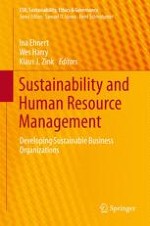2014 | OriginalPaper | Chapter
A Stakeholder Perspective for Sustainable HRM
Literature Review and a Research Agenda
Authors : Marco Guerci, Abraham B. (Rami) Shani, Luca Solari
Published in: Sustainability and Human Resource Management
Publisher: Springer Berlin Heidelberg
Activate our intelligent search to find suitable subject content or patents.
Select sections of text to find matching patents with Artificial Intelligence. powered by
Select sections of text to find additional relevant content using AI-assisted search. powered by
